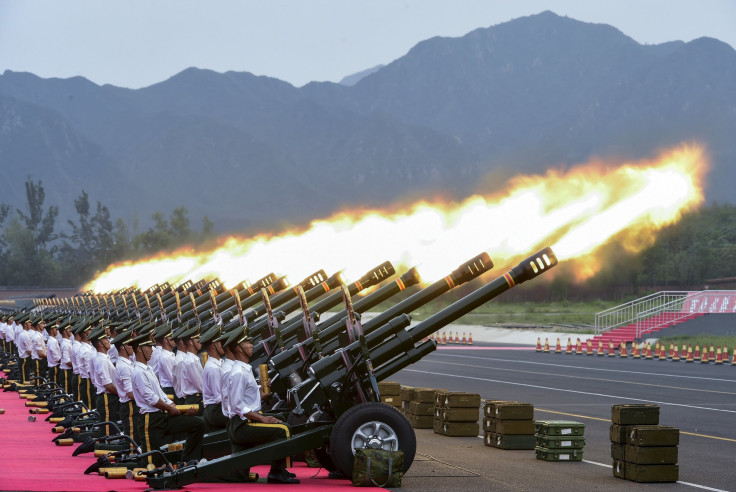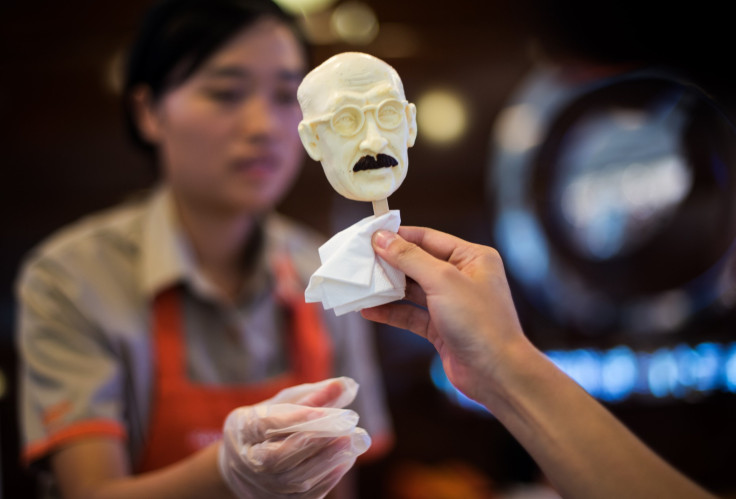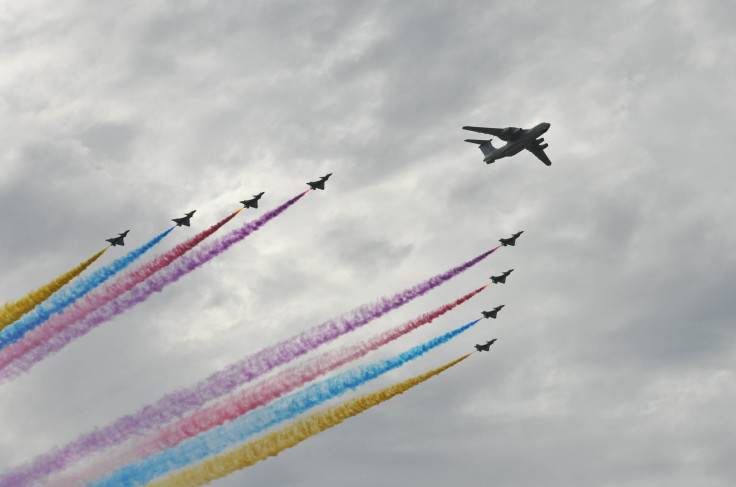Security Tight In Beijing As Putin, Ban And Blair Join China's Controversial WWII Victory Parade

SHANGHAI — Normal life in the Chinese capital Beijing ground to a halt Wednesday evening, as massive security precautions were put in place for a huge military parade to celebrate the 70th anniversary of the defeat of Japan in World War II.
Subway stations and the main shopping street Wangfujing have been closed until Thursday afternoon, along with shops and food stalls in central Beijing. Many hotels have canceled bookings for guests until Friday, and citizens have been given a three-day holiday for the event, with many cars being kept off the roads to ensure blue skies in the famously polluted city. The authorities have even banned locals from flying their homing pigeons, while the military is reported to have used trained monkeys to remove birds from trees near an air base to stop them getting in the way of planes taking part in the observance.
The event is officially described as China’s first-ever official celebration of the defeat of Japan, which brutally occupied much of eastern China for almost a decade from 1937 to 1945, leaving an estimated 35 million Chinese soldiers and civilians dead. Although it’s billed as a parade to celebrate the global victory over fascism in World War II, it has also provoked controversy in Asia and elsewhere, with some of China’s neighbors alarmed at the show of military strength the parade will feature, and critics saying it is designed in part to boost the aura of China’s President Xi Jinping as the country’s most powerful leader since former Chairman Mao Zedong.
Most leaders of the Allied powers have declined to attend. For examples, the U.S. will be represented by Ambassador to China Max Baucus and the U.K. is sending former government minister Kenneth Clarke, although ex-Prime Minister Tony Blair will be attending in a private capacity. Japan has also declined an invitation to attend, prompting further tensions with China.
Leaders who will be there include Russian President Vladimir Putin and the presidents of South Korea (another country occupied by the Japanese during the war), Pakistan and Sudan. They will see a parade of 12,000 military personnel and a demonstration of Chinese military firepower. Chinese officials have promised the “the world’s largest” helicopter flyby, along with a colored vapor trail made by fighter jets designed to stretch almost 5.7 miles. And state media have said the event will showcase more than 500 pieces of the Chinese military’s “latest ground and naval equipment as well as nearly 200 advanced aircraft ... 84 percent of which have never been viewed by the public.” Many of the weapons are Chinese-made, including what one Chinese expert described as “the world’s only anti-ship ballistic missiles,” a new intermediate-range ballistic missile that some analysts suggested could be capable of hitting U.S. bases in Guam -- and a new bomber that experts said could hit “targets as far away as Australia.”
Chinese officials have said the unprecedented display of the country’s newest weaponry is a sign of the nation’s growing transparency about its defense capabilities. However, other observers have said it is also being seen, particularly by China’s neighbors, as a signal of Beijing’s increasingly assertive stance on the international stage, with Hong Kong’s South China Morning Post suggesting that “China is reminding Asia and the world of war, rather than peace” through the event.

The parade has certainly highlighted ongoing tensions between China and Japan. In addition to Japanese leaders turning down invitations to attend, Chief Cabinet Secretary Yoshihide Suga reportedly said that such an event would not help regional peace or stability. To China, which says Japan still owes it a formal apology for its wartime acts, this was a provocative statement: The official Xinhua News Agency said such comments were “proof that historical revisionism is, once again, rearing its ugly head” and that Japan was seeking “to gloss over the atrocities” it committed during World War II.
Continuing tension over islands in the East China Sea, claimed by both countries, and over visits by Japanese officials to a shrine to convicted war criminals, have been heightened by Japan’s recent vote to revise its postwar so-called pacifist constitution, so that it no longer limits Japan’s military to self-defense operations. Xinhua contended relations between Japan and its Asian neighbors “have soured to near all-time lows,” while warning of an “ideological shift to the right” in Japanese politics that already could have the country “on the dangerous path toward future warfare.”
Meanwhile, Japan criticized the decision by United Nations Secretary-General Ban Ki-moon, a former South Korean foreign minister, to attend the parade, saying he was compromising the neutrality of the U.N. China’s Foreign Ministry retorted that such comments were “deliberately provocative” and “very irritating.”
Other invited guests have attracted criticism for different reasons. The U.S. has criticized China for inviting Sudan’s President Omar al-Bashir, who has been indicted for crimes against humanity relating to the Darfur crisis by the International Criminal Court in the Hague. China responded by saying the invitation was appropriate because Sudan, “a friendly country to China,” had been a battleground during World War II. The official Global Times added to the sense China was flexing its muscles over international affairs -- saying that “if China dare not make independent judgments and avoids developing ties with a certain country simply because the West doesn’t like it and its leaders, China can never establish its own prestige and will fall into being a political vassal of the West.”
Some critics have also questioned the participation in the parade of soldiers representing countries that were not involved in the war: One observer asked whether nations such as Mexico, Pakistan and Venezuela were just using the parade to improve their relations with China.

What’s not in doubt is that China wants to emphasize the price the country paid for its fight against Japan and its role in helping to end World War II. Some Western scholars, including Rana Mitter, author of a recent book on the subject and professor of the history and politics of modern China at the University of Oxford, agree that the country’s role in combating the Japanese has not been sufficiently recognized around the world. Chinese officials have stressed that more than 1.5 million Japanese troops were killed in China and suggested that ideological considerations have led to the nation’s contributions being belittled.
“Certain people in the West have always lacked an objective and just recognition of China’s position and role in the world anti-fascist war,” senior official Wang Shiming told reporters at a news conference introducing the parade, while other officials have called for “respect for history.”
However, the parade has also stirred debate about exactly whose history should be respected. Some observers -- both outside China and on the Chinese Internet -- have pointed out that much of the fighting against the Japanese was done by troops of China’s former nationalist ruling party, the Kuomintang, or KMT, which subsequently lost the Chinese Civil War to the Communists and retreated to the island of Taiwan in 1949.
The parade does include some official recognition of the KMT’s role, in a marked change from the not-so-distant past, when its adherents were depicted as traitors who had failed to defend China against the Japanese. Veteran KMT soldiers will join the parade, while former KMT Chairman Lien Chan is among the dignitaries attending. However, their participation has not been endorsed by the current KMT leadership, which is not sending an official representative: Some critics in Taiwan and Hong Kong have said that the parade gives the Chinese Communist Party too much credit for the battle against Japan.
Meanwhile, Chinese officials have emphasized the contribution of Communist guerrillas to the struggle. And the government has sought to quash such debate within China. Authorities announced this week that they had “punished” a number of people who had spread “seditious rumors about China’s upcoming celebrations of the 70th anniversary,” although they did not give further details.
Such censorship, along with reports that authorities may have tightened controls on some virtual private networks (VPNs) -- which allow people to get around China’s “great firewall” restrictions on Internet access -- in the run-up to the parade, has raised other questions. Human-rights groups have contended the government’s commitment to promoting peace is undermined by a recent crackdown on civil liberties, including heightened controls on public debate, and the detention of journalists, lawyers and civil-society activists.
Some Western observers have also expressed anxiety that the parade appears to highlight China’s warming ties with Russia. This is the third meeting between Xi and Putin this year. Despite the leaders’ continuing differences over issues such as the piping of Russian gas to China and the treatment of Chinese traders in the Russian Far East, analysts says their relationship is growing increasingly close, partly as a counterbalance to Western domination of international affairs. This year, the two countries held joint naval exercises in the Mediterranean, emphasizing the growing reach of China’s navy, and in waters between China and Japan. And some observers believe that Putin’s combination of personal popularity with a tough approach to international and domestic issues is seen by China’s top leader as an appealing model: One video produced by an officially endorsed Chinese production studio this year highlighted similarities between the two presidents.
Overall, some observers have also seen the event as a way for Xi to boost his growing reputation as the country’s most powerful leader since Mao. His meetings with army veterans before the parade and his presiding over the event are designed to emphasize his control over the military -- the leadership of which he has purged in an anti-corruption campaign -- analysts say. And his decision to pardon some jailed criminals as a means of marking the anniversary has been described by some observers as putting him on a par with Mao, the last leader to issue such pardons, although Chinese officials say the move actually shows the government’s growing respect for the rule of law and individual rights.
Whatever the case, the 70-minute extravaganza, to be shown live on state television, is likely to leave few observers unmoved.
© Copyright IBTimes 2024. All rights reserved.












